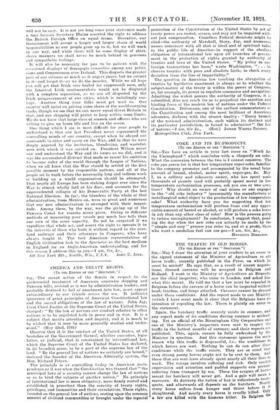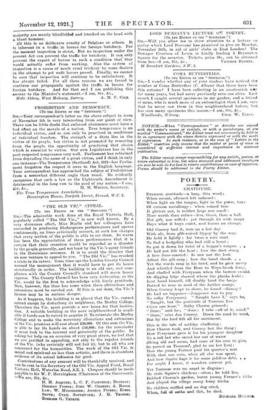THE TRAFFIC IN OLD HORSES.
[To THE EDITOR OF, THE " SPECTATOR.") Sta,—May I draw the attention of your. readers to an error in the signed statement of the Minister of Agriculture re old horse traffic, -recently published in the Press, on which he must be misled? He says that, as a result of recent negotia- tions, dressed carcases will be accepted in Belgium and Holland. I went to the Ministry of Agriculture at Brussels, saw the chief inspector, who came to London, and asked him what this meant. He told me that a law must be repealed in Belgium before the carcase of a horse can be imported without head, trachea, and lungs attached. Carcases cannot be dressed under those conditions. And the report made to our Ministry (which I have seen) made it clear that the Belgians have Be intention of repealing the law. There is plainly an error in the statement.
Again, the butchery traffic scarcely exists in summer, end any report made of its conditions during summer is mislead- ing. Yet an official of the Birmingham City Corporation and one of the Ministry's inspectors were sent to inspect the traffic in the hottest months of summer, and their reports are published. This, again, cannot be fully understood by the Minister in question. And this statement ignores the main reason why this traffic is disgraceful, i.e., the conditions to which horses are sent. Nothing he can do can alter those conditions while the traffic exists, They are so cruel that even strong young horses ought not to be sent to them. And those that are sent have already spent nearly all their lives in work. The voyage involves suffering and risk. Only
careful
supervision • and attention and padded supports can prevent suffering from transport by sea. These the cargoes of horses meant for butchery will never get. And a gale will mean .s massacre. At Antwerp the ration of hay is ridiculously flume- quate, and afterwards all depends on the butchers. Neely every horse suffers from hunger and thirst before it is slaughtered. And nearly 'every horse is cruelly killed. Only a few are killed with the humane - killer. In Belgium file
majority are merely blindfolded and knocked on the head with a blunt hammer.
All this is no deliberate cruelty of Belgians or others. It is inherent in a traffic in horses: for foreign:butchery. For the moment inspection is strict.. But no inspection under the present Act can prevent the traffic for butchery. It can only. prevent the export of horses in such a condition that they would actually suffer from working. Also the system of inspection is a cause of much cruel trickery by some dealers in the attempt to get unfit horses passed. Finally, we cannot be sure that inspection will continue to be satisfactory. It has always failed. For all these reasons we are forced to Continue our propaganda against the traffic in horses for foreign butchery. And for that end I am publishing this answer to the Minister's statement.—I am, Sir, he.,
Mole Abbey, West Molesey, Surrey. A. M. F. COLE.







































 Previous page
Previous page